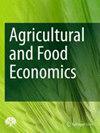Prioritization of e-traceability drivers in the agri-food supply chains
IF 4.5
2区 经济学
Q1 AGRICULTURAL ECONOMICS & POLICY
引用次数: 0
Abstract
Abstract Electronic traceability (e-traceability) is a growing trend in the agri-food industry, offering improved transparency, accountability, and reduced risk of foodborne illnesses through the use of electronic systems to trace products throughout the entire supply chain. E-traceability drivers in the agri-food supply chain encompass diverse factors motivating companies to adopt electronic systems for product tracking, aiming to enhance visibility, minimize risk, ensure compliance, and promote safety, sustainability, and efficiency through clear and verifiable records of product origins, quality, and sustainability, building consumer trust and loyalty. By identifying the main drivers of e-traceability, this research aims to shed light on the factors that motivate companies to implement electronic systems for tracking and monitoring products. For solving this problem of multi-criteria decision-making (MCDM), this study proposes a hybrid MCDM model. The model combines “Factor Relationship” (FARE) and “Axial Distance-based Aggregated Measurement” (ADAM) methods in the fuzzy environment. The results indicate that the most important drivers are supply chain efficiency, technology development and sustainability. These drivers are critical and they significantly impact the successful implementation and adoption of e-traceability strategies in the agri-food sector.在农业食品供应链中优先考虑电子可追溯性驱动程序
电子可追溯性(e-traceability)在农业食品行业是一个日益增长的趋势,通过使用电子系统在整个供应链中跟踪产品,提供更高的透明度、问责制和降低食源性疾病的风险。农业食品供应链中的电子可追溯性驱动因素包括各种因素,促使公司采用电子系统进行产品跟踪,旨在提高可见性,最大限度地降低风险,确保合规性,并通过清晰和可验证的产品来源,质量和可持续性记录促进安全性,可持续性和效率,建立消费者的信任和忠诚度。通过确定电子可追溯性的主要驱动因素,本研究旨在揭示激励公司实施跟踪和监控产品的电子系统的因素。为了解决多准则决策(MCDM)中的这一问题,本文提出了一种混合MCDM模型。该模型结合了模糊环境下的“因子关系”(FARE)和“基于轴向距离的聚合测量”(ADAM)方法。结果表明,最重要的驱动因素是供应链效率、技术发展和可持续性。这些驱动因素至关重要,它们对农业食品部门电子可追溯战略的成功实施和采用产生了重大影响。
本文章由计算机程序翻译,如有差异,请以英文原文为准。
求助全文
约1分钟内获得全文
求助全文
来源期刊

Agricultural and Food Economics
Agricultural and Biological Sciences-Agricultural and Biological Sciences (miscellaneous)
CiteScore
5.50
自引率
5.10%
发文量
29
审稿时长
13 weeks
期刊介绍:
Agricultural and Food Economics (AFE) is an international peer-reviewed and open access journal published on behalf of the Italian Society of Agricultural Economics. AFE welcomes research articles from economists, scholars and researchers from all over the world to publish problem-oriented and high-quality articles. AFE publishes only original articles from a wide variety of economic perspectives that address current and relevant issues related to the agricultural and food system. AFE publishes articles focused on applied analysis, the discussion of innovative results, and relevant policy and managerial implications. AFE seeks clearly written articles from experts in the field, to promote insightful understanding of the current trends in the agri-food system. Topics of specific interest to AFE include agricultural and food market analysis, agri-food firm management and marketing, organization of the agri-food chains, consumer behavior, food quality and safety issues, economics of nutrition and food security, food and health economics, agri-food policy and trade, sustainable rural development, natural and marine resource economics and land economics.
 求助内容:
求助内容: 应助结果提醒方式:
应助结果提醒方式:


